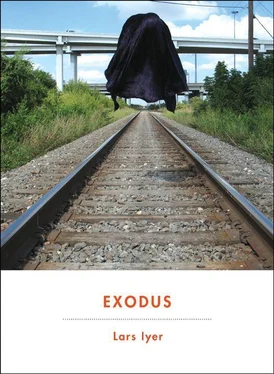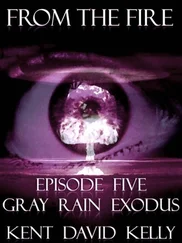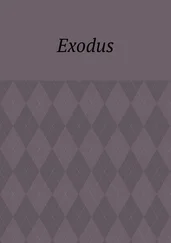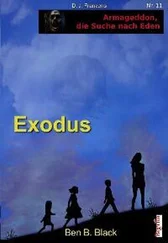Like everyone else, I went to work in the hi-tech industrial estate. W. pictures me heading home from work, past the fenced-off patches of land between the company buildings of Winnersh Triangle. He pictures me looking over long puddles in the mud, after the gypsies had churned up the grass with their caravans. This was all that was left of the wilderness! All that was left of unused space!
‘So you went north’, W. says. I went north. — ‘Of course you did, where else were you to go?’ To the north, the very opposite of the suburban south! To the north, of decaying industry and terminal rustzones! To the north, of canal towpaths and broken girders! To the north of rain, eternal rain!
I went to Manchester, the city of eternal blight. I went to study in the city of mass unemployment and mass misery. I went to study philosophy in a city that had been left to fall apart like a Russian space station.
And did I find my people ? W. says, knowing the answer. Did the Mancunians welcome me as one of their own ? No! — muggers held knives to my throat. Junkies trailed after me asking me for money.
I found a cheap bedsit next to the curry house extractor fans, didn’t I? W. says. There’s a crack in the wall, I told the landlord, when he showed me the room. — ‘A crack in the wall, yes’, he said, and smiled. I could hardly breathe for cold and curry, but I took the room nonetheless, because it cost nothing and I had nothing. — ‘You were born for squalor’, W. says.
‘Staines — what a name for a town!’, W. says. And, a little later, ‘Egham — it’s unbearable!’
This is suicide country , W. says. He’d top himself if he lived here. He’d either top himself, or think some great thought, W. says.
To think against the suburbs. To think in the suburbs, hating the suburbs. What pressure of thinking you could build up! What a head of steam! — ‘But it didn’t work for you, did it?’
He sees why, W. says. The suburbs only gave me fear — the fear of falling back into the suburbs. The fear of crashlanding here, where I grew up. That’s why I’ve flung myself into administration, W. says. That’s why I’ve tried to lodge myself in the administrative work of the university, like a tick in an armpit. — ‘But they’ll find you in the end’, W. says. ‘They’ll smoke you out and recapture you. And there you’ll be, coughing in the suburban sun …’
We speculate about the lost geniuses of the suburbs . Bracknell’s secret Rilke (Coetzee lived in Bracknell, W. says) … Martin Heron’s hidden Leibniz (W.: ‘Martin Heron!?’). And Sunningdale’s own Solomon Maimon, drunk in Tesco’s carpark …
You’d have to go on the sick, if you lived in the suburbs, W. says. You’d have to stay unemployed, wandering the streets with the early-retired and the mothers pushing buggies. And you’d go mad from isolation. You’d go off your head. And then you’d top yourself.
Why do I always bring Hello! magazine with me on our train journeys? W. wonders. Why do I insist on leaving it in his study when I come to stay?
‘Who are all these people?’, he wants to ask me, when he sees me reading. ‘Why do they matter to you?’ Because they do matter to me, that much is clear, W. says. The way I read. The way I nod my head over the glossy pages, like a Jew over the Talmud, W. says. He sees, as at no other time, a look of absolute seriousness on my face. There it is: an intensity of focus that only the Husserl archives could warrant.
‘What are you looking for?’, W. says. What, in Oscar dresses and airbrushed actresses? What, in the photospreads of Queen Rania of Jordan?
In the end, I admire the great philosophers only as I admire the celebrities in my gossip magazines. Their brilliance is only the equivalent of a celebrity’s beauty; their integrity only the fervour of an ingénue’s rise to fame. My stupidity places them at an infinite and glamorous remove.
It’s different with him, W. says. He’s that little bit cleverer than me, that little bit farther ahead, and it’s enough that his non-intelligence, unlike mine, is commensurable with real intelligence; his non-integrity, with real integrity. At least he has the glimmerings of the faith of a Rosenzweig, a Weil and a Kierkegaard, W. says. At least he has an idea of belief.
When he writes of them, he leaves the great thinkers intact in their magnificence. They remain remote and brilliant in the sky of thought. But when I write of them? I make others doubt , W. says. I make others despair . Are Rosenzweig, Weil and Kierkegaard really so worthwhile if Lars is writing on them? people ask themselves. Can they really be so great if Lars is thinking about them?
He needs a tranquiliser gun, W. says, with a dart strong enough to bring down an elephant. How else is he going to stop me rampaging through philosophy, tearing up everything with my tusks?
That I write on Western philosophy is really the destruction of Western philosophy, W. says. That I write on religious ideas is really the destruction of all religious ideas. And that I pretend to think is really the destruction of thought, affecting all thinkers, everywhere.
Schelling, Feuerbach … no one’s safe when I begin to think. Maimon, Nicholas of Cusa … Is there anyone who might be saved?
A rumbling through the heavens: Lars is writing one of his commentaries! Angels’ cries: Lars is defiling Rosenzweig! And Weil! And Kierkegaard — what’s Lars going to do with him?
No one reads a line he writes, W. says. What he writes is of no significance at all. But when I write — when I publish my reflections, if he can call it publishing, if he can call them reflections — he wants to clasp the entire oeuvres of Bataille, Weil and Kierkegaard to his breast, W. says. He wants to build a big wall around the library and all libraries, posting sentries to shoot me on sight. But he knows, like the Red Death of Poe’s story, that I’m in there already, that my reading is eating away at those oeuvres like cancer.
Twickenham. Putney. And Clapham Junction, where the track braids together with a myriad of others, and trains like ours run a parallel course.
My life in Manchester, in old Manchester, before the regeneration. What was I reading in my bedsit by the curry house extractor fans? W. wonders. What, as cold air poured into my room from the crack in the wall? Kafka, of course. Kafka, spuriously.
W. read Kafka as he travelled through Europe, as he surveyed the European scene from his train window. He read about the Austro-Hungarian empire and its collapse, as the train passed through Freiburg, and about the generation of German Jews in its final hour, as he arrived in Strasbourg.
As his train crossed the Alps, W. read about Benjamin and Scholem who, making constant reference to Kafka, discussed the fine line between religion and nihilism in their letters. In a café in Berne, W. read of their attempt to develop, each in their own way, a kind of anarcho-messianism , an apocalyptic antipolitics , and their discussion about whether the coming of the Messiah meant the dissolution of the Law or its fulfilment .
And me — what was I reading to contextualise my Kafka studies? What, as I wandered through the university library? But I had no idea of Kafka’s milieu. To me, Kafka was only a meteor who had arrived from nowhere.
It was Kafka who led me from the south to the north, W. knows that. It was Kafka who led me into the university. Before Kafka, there was my warehouse life. My life as a finder of UTLs, unable-to-locates, searching up and down the warehouse aisles.
Читать дальше












